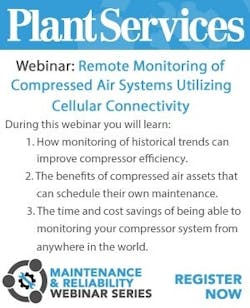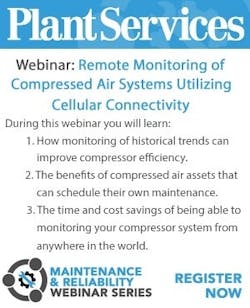Get connected to your air compressor with cellular technology
John Smithey is the connectivity manager for Quincy Compressor. In his six years with the company, Smithey has held key roles in after-market services and piston product management. His current position is focused on bringing high-value aftermarket programs and solutions to the market with a focus on connectivity, controls, and optimization.
During the live Q&A portion of the on-demand webinar "Remote Monitoring of Compressed Air Systems Utilizing Cellular Connectivity," Smithey tackled several attendee questions on best practices for implementing cellular connectivity.
PS: What steps are taken to prevent outsiders from getting into the public cellphone network and into a plant data system? How do you ensure cybersecurity?
JS: I want to really emphasize the fact that cellular connectivity is a cellular system. It is not going to be tied into your network. It is not going to be tied into your systems, so it will not serve as a gateway for a virus or a gateway for someone to come into your systems. Also, it's a monitoring device only, so it's not going to allow someone to stop your compressor or gain control of the machine in any way. It's solely to monitor the machine.
PS: Let's say you have a customer that has three compressors from three different manufacturers. What are some best practices that you'd recommend?
JS: You can absolutely use different types of situations there. You can use a DIN box with competitive machines, which allows you to put in different inputs like dew point, pressure, or flow. You can use an input box and then connect the cellular modem through the input box. That way, you can monitor any machine type. It's very flexible. It can be a gauge machine. It can be a VFD. It can be competitive equipment. All you need is an input and a power supply and a good cell signal.
You can also put it in the header of the system and hook flow meters and other instruments there. Again, it doesn't have to be on the machine. It can be out in the plant, in the header, getting good information and sending it back.
PS: What are some common questions you get from people who are evaluating how remote connectivity, cellular connectivity, can work for them? Can you offer any best practices?
JS: We get a lot of questions about cellular connectivity, and the real key to making it work is that you've got to connect. You need to connect the machines. You need to use the data that the machines give you. Sign up for the text messages and make sure you're getting that information. Remember, a machine that's serviced on time and properly will give you 16 days of more availability (per year).
As far as best practices, I would connect the machines, and I'd make sure that you have people (your service folks) tied into the machines and getting the notifications. That way, you fix problems before there's any downtime at all, which is very value-added.

